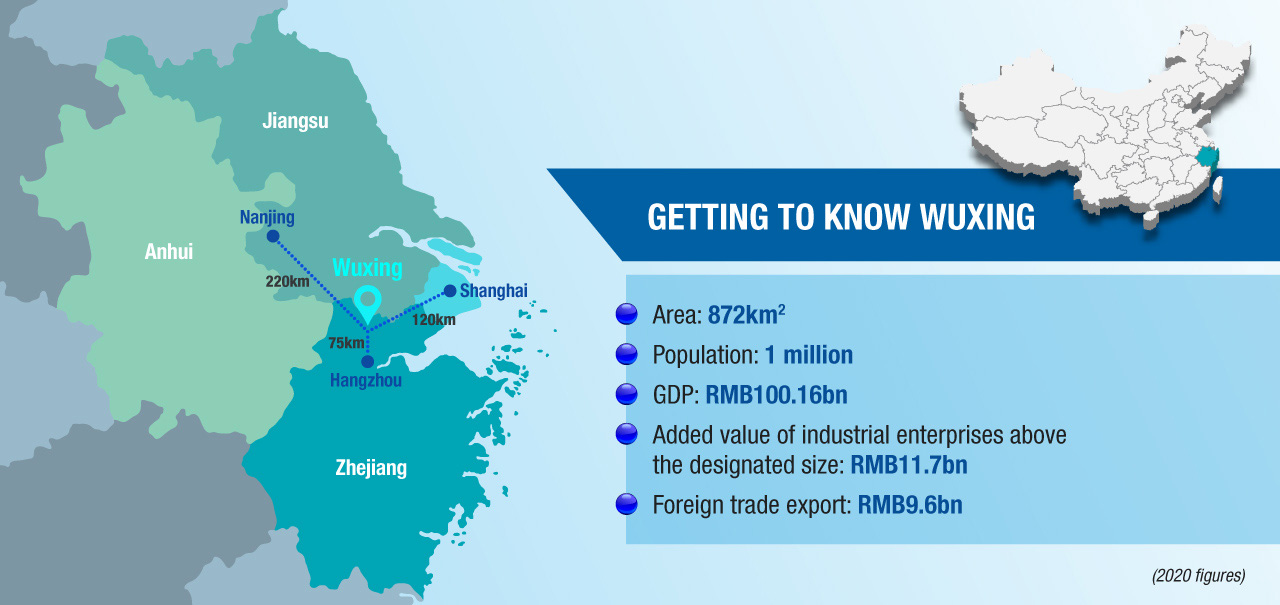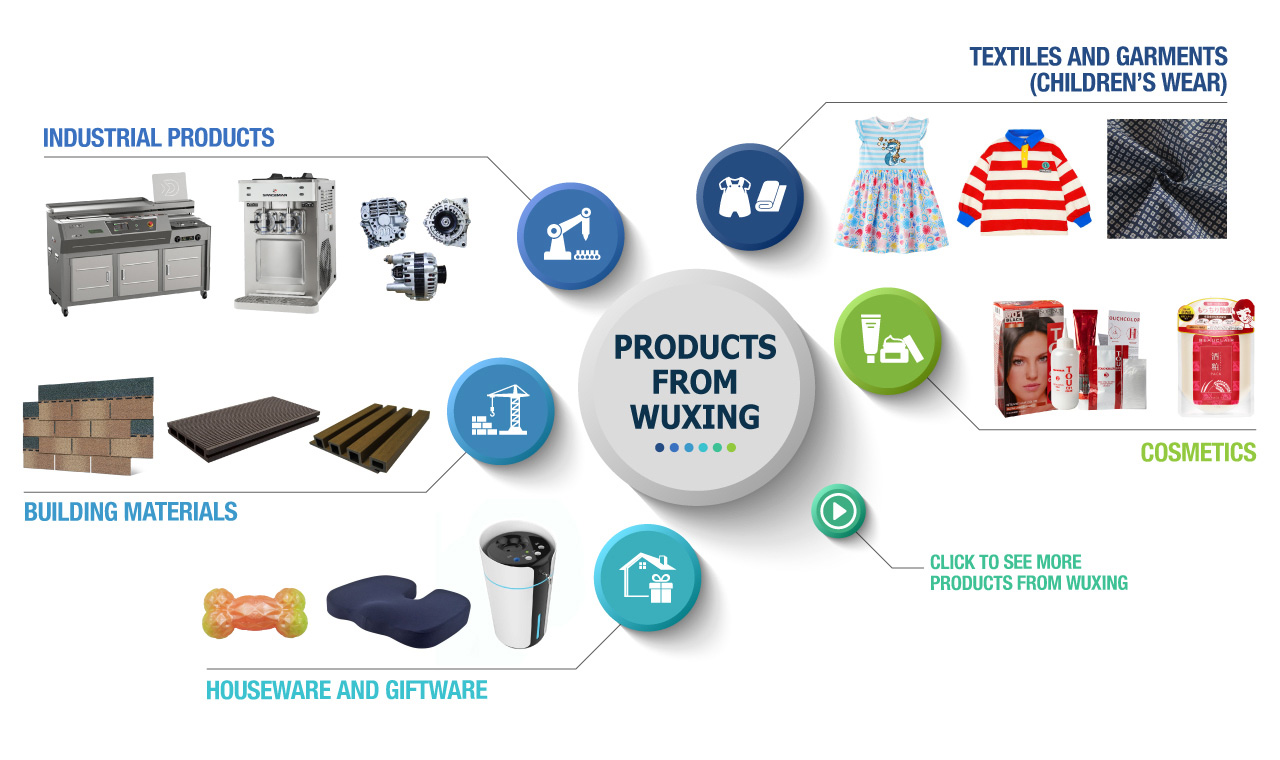Located in Huzhou City of Zhejiang Province, Wuxing has been delivering brilliant economic and industrial performances as its steady development and policies have fostered an increasingly favourable business environment
With a population of one million people, Wuxing is the central and main urban district of Huzhou City in Zhejiang Province. The district covers an area of 872 square kilometres and is located in the north of the province and on the south bank of Tai Lake. Shanghai lies 120 kilometres away to the east of Wuxing, while Hangzhou City 75 kilometres to its south. To the district’s west is Nanjing, 220 kilometres away, and Suzhou City and Wuxi City is in the north with Tai Lake in between. Wuxing is at the intersection of Shanghai and the three provinces of Jiangsu, Zhejiang and Anhui. It also connects the north and south wings of the Yangtze River Delta and the east and central regions, which truly makes it the heart of the region.
Wuxing is the birthplace of the culture of silk, tea, calligraphy and painting, as well as the country’s beautiful villages. For many years, Wuxing has been shortlisted in all the categories of Mainland China’s top 100 districts list — comprehensive strength, green development, investment potential, technological innovation and new urbanisation quality. In 2020, the district was named one of the top 100 areas in the country in terms of high-quality development, industrial performance, business environment and comprehensive strength in tourism, and was the best in the country in urban and rural planning. In addition, it is a demonstration area of the development of ecological civilisation in Mainland China.

Comprehensive strength and distinctive industrial features
Since its establishment in 2003, Wuxing’s GDP has grown by more than seven times, total fiscal revenue by more than 12 times and local fiscal revenue by nearly 16 times. In 2020, its GDP increased by 3.5 per cent to RMB100.16bn, making it the first area in Huzhou City to have its GDP exceed RMB100bn.The added value of industrial enterprises above the designated size grew by 4.6 per cent to RMB11.7bn, which was the second-highest in the city. The added value of the strategic emerging industry and equipment manufacturing industry increased by 19.1 per cent and 14.8 per cent, respectively, both of which ranked first in the city. The added value of the new and hi-tech industries accounted for 79.9 per cent of the added value of the industrial enterprises above the designated size and was top in the city. The added value of the service industry increased by 5.6 per cent to RMB38.84bn and drove a 2.7 percentage points growth in Wuxing’s GDP, while that of the agricultural industry increased two per cent to reach RMB2.45bn.
In recent years, Wuxing has implemented the “Internationalisation+” initiative, significantly enhancing its competitiveness on the global market and helping to maintain steady growth in foreign trade. The district’s exports cover hi-tech machinery, textiles and garments, metal and wooden products and daily necessities. Products are exported to over 160 countries and regions including the US, the EU and Southeast Asia.
The district has been investing in more than 20 countries and regions in sectors such as machinery, modern textiles, new energy and logistics equipment. In 2020, Wuxing achieved RMB9.6bn in foreign trade export. The largest and second-largest export categories of the district were mechanical and electrical products and textiles and garments, which accounted for 39.1 per cent (RMB3.75bn) and 38 per cent (RMB3.6bn), respectively. The textile and garment category’s foreign trade degree of dependence was higher than that of Wuxing by 3.9 percentage points.
Wuxing has six well-known industrial bases, namely children’s wear, branded cashmere products, metal pipes, aluminium alloy profiles, modern logistics equipment and cosmetics. The first two are the largest of its kind in Mainland China while the others are key bases in the country. These industrial bases have fostered ten listed companies including Dehong Automotive. They have also helped to form four leading industries in Wuxing: the smart equipment industry, which includes new energy vehicles, logistics equipment, industrial robots and engineering machinery; the digital economy industry, which includes integrated circuits, artificial intelligence, high-end electromagnetic wires, Internet of Things and big data; the healthcare and lifestyle industry, which includes health food, cosmetics, ecological healthcare and medical diagnosis, treatment and rehabilitation; and the tourism industry, which aims at turning Wuxing into a world-class village holiday resort.
- Textile and garment industry
The textile and garment industry is a traditional pillar industry in Wuxing, which consists of five industrial clusters, namely children’s wear, cashmere products, functional fibres, home textiles and silk weaving. In 2020, the total output value of industrial enterprises above the designated size was RMB17.65bn, accounting for 28.5 per cent of that of the whole district. The industry generated RMB21.77bn of revenue, which accounted for 31.5 per cent of that of the district and hired 165,000 of people, equivalent to 28.4 per cent of the district’s workforce.
Wuxing is the country’s largest production base for children’s wear. It has formed an entire industrial ecosystem covering innovation, R&D and design, manufacturing and processing, online and offline sales, logistics, material and accessories supply and brand building. Currently, there are more than 14,000 companies in Wuxing, altogether producing 1.45 billion pieces (sets) of children’s clothing each year and generating annual sales of over RMB65bn. The district’s children’s wear output accounts for two-third of that of the total national production.
Wuxing’s Zhili Town is acclaimed as a “Town of Children’s Wear” and a “Town of Branded Cashmere Clothing” in Mainland China. In 2018, Wuxing was chosen as a national base for foreign trade transformation and upgrading (textiles and garments). In 2020, the district was shortlisted as a national cross-border e-commerce comprehensive pilot zone, while the Huzhou (Zhili) Trading Centre for Children’s Wear and Consumer Goods was approved as a national test point for procurement and trade. - Smart equipment industry
The smart equipment industry is one of the equipment manufacturing industries enjoying strong support from Wuxing. It has established a complete industrial chain integrating equipment manufacturing, R&D and design, smart supporting and integrated services. The industry has more than 100 enterprises, each with an output value of more than RMB100m, over 300 brands with distinctive products, nearly 200 hi-tech enterprises, four incubators that are above the provincial level and over 120 provincial-level enterprise R&D centres and research institutes.
Wuxing is an important logistics equipment manufacturing base in both Zhejiang Province and the Yangtze River Delta and is committed to becoming “the Chinese Logistics Valley”. It is home to a group of leading logistics equipment companies, including Sany Equipment, Dema Technology and Jingxing Logistics Equipment, which forms the backbone of Wuxing’s high-end equipment industry. Renowned companies such as Fengshen Logistics and Langao Logistics have also been attracted to station in Wuxing. The district has pushed forward the emergence of a batch of professional, specialised, distinctive and successful supporting enterprises, as well as promoted the development of the industry in moving towards the mid- to high-end value chain. Dema Technology and Liju Boiler are on the national list of “Little Giants”, which recognises companies with specific market orientation, excellent innovation capabilities, large market shares, core technologies, high product quality and profitability.
Moreover, an array of Wuxing products is named “Quality Goods from Zhejiang” and selected into the province’s Dedicated Scheme for Key Technological Innovation and Key Hi-Tech Product Development Project. Wuxing continues to promote green manufacturing and the conversion of old and new kinetic energy. Having achieved remarkable results, the district is now on Zhejiang’s pilot list of Demonstration Cities for Resource Recycling. - Cosmetics industry
Wuxing is actively establishing itself as Mainland China’s cosmetics town and as a provincial-level demonstration and benchmark town for the cosmetics industry. The district is bringing in middle- to high-end cosmetics companies and supporting projects to create a complete industrial chain that is led by manufacturing and by industry leaders including Proya Cosmetics. Positioning its cosmetics industry as distinctive, centralised, delicate and structurally innovative, Wuxing is committed to building itself into a centre for cosmetics manufacturing, cosmetics cultural experience, cosmetics expos and cosmetics talent and technology.
Wuxing has signed strategic agreements with governmental organisations and industry associations from 29 countries, including the French Cosmetics Valley, the city of Chartres, Fédération Française des Écoles de l’Esthétique et de la Parfumerie (Higher School of Beauty and Makeup of France) and the Korea Cosmetic Association, to help the sustainable development of the cosmetics industry. Since its establishment in 2015, Wuxing’s Beautéville has attracted a lot of media attention, from Mainland China’s Cosmetics Newspaper to Cosmetic Marketing News from France and Beautynury from Korea, among others. It has been featured over 400 times by national and provincial media including the People’s Daily. The fifth edition of the Cosmetics Industry Leaders Summit was one of the supporting activities of the 2019 China International Import Expo (Zhejiang edition).
Powerful platforms and favourable business environment
Wuxing is taking forward the establishment and consolidation of various industry development platforms. The smart logistics equipment industry platform is one of the new industry platforms being nurtured by Zhejiang Province. The Wuxing Economic Development Zone ranks within the top 10 in the assessment and evaluation of provincial development zones. The Silk Town and Beautéville are officially named as provincial-level towns with distinctive features and the Wuxing Science and Technology Park was rated as a national demonstration base for entrepreneurship and innovation of small and micro enterprises.Capitalising on the construction of the Shanghai–Huzhou Green and Smart Manufacturing Corridor, Wuxing has built multi-level industry development platforms to meet the needs of industrial project realisation, investment and entrepreneurship. They include a 1.08 million-square-metre technology and innovation base, a 2.4 million-square-metre industrial park for small and micro enterprises, 1.5 million-square-metre building areas, a 150,000-square-metre co-working space and a 300,000-square-metre cross-border e-commerce industry platform.
As a fully functional district, Wuxing offers strong support for businesses and comprehensive ancillary facilities in respect of daily necessities. Companies in Wuxing enjoy relatively low overall business costs. The district has “one-stop” procedures for all business matters and has drastically reduced work items, workflows, materials and processing time. Currently, it takes no more than 80 days to approve a corporate investment project, while company incorporation can normally be processed in 20 minutes. All tax payments can be settled digitally.
Thanks to a favourable location and comprehensive cost advantages, Wuxing is an excellent choice for investments and business in the Yangtze River Delta.

